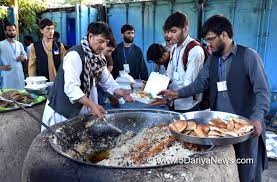
Aljazeera: A month after seizing Kabul, the Taliban is facing daunting problems as it seeks to convert its lightning military victory into a durable peacetime government.
After four decades of war and the deaths of tens of thousands of people, security has largely improved but Afghanistan’s economy is in ruins despite hundreds of billions of dollars in development spending over the past 20 years.
Drought and famine are driving thousands from the country to the cities, and the World Food Programme fears its food supplies could start running out by the end of the month, pushing the 14 million food-insecure Afghans to the brink of starvation.
While much attention in the West has focused on whether the new Taliban government will keep its promises to protect women’s rights and to reject groups like al-Qaeda, for many Afghans the main priority is simple survival.
“Every Afghan, kids, they are hungry, they don’t have a single bag of flour or cooking oil,” said Kabul resident Abdullah.
‘Food emergency’
On Tuesday, Rein Paulsen, director of the Food and Agriculture Organization’s Office of Emergencies and Resilience, told reporters at the UN headquarters in a video briefing from Kabul that four million Afghans are facing “a food emergency”.
Paulsen said 70 percent of Afghans live in rural areas and there is a severe drought affecting 7.3 million Afghans in 25 of the country’s 34 provinces.
These vulnerable rural communities have also been hit by the pandemic, he said.
Paulsen said the winter wheat planting season – the most important in Afghanistan – is threatened by “challenges of the cash and banking system” as well as challenges to markets and agricultural items.
“More than half of Afghans’ daily calorific intake comes from wheat,” he said.
If agriculture collapses further, Paulson warned, it will drive up malnutrition, increase displacement and worsen the humanitarian situation.
Long lines still form outside banks, where weekly withdrawal limits of about 20,000 afghanis ($200) have been imposed to protect the country’s dwindling reserves.
Impromptu markets where people are selling their possessions have sprung up across Kabul, although buyers are in short supply.
International donors have pledged more than $1bn to prevent what UN Secretary-General Antonio Guterres warned could be “the collapse of an entire country”.
Even with billions of dollars in foreign aid, Afghanistan’s economy had been struggling, with growth failing to keep pace with the steady increase in population. Jobs are scarce and many government workers have been unpaid since at least July.

